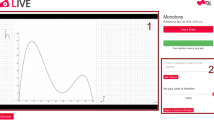Abstract
This paper examines the effect of explicitly presenting types of questions to students in an online learning environment. In our setting, people are shown online videos for lectures and then asked to raise questions. We compare the collected questions with those collected in the same situation but without presenting types of questions. We find that presenting types of questions improves the quality of questions, but does not increase the number of questions raised.
Access this chapter
Tax calculation will be finalised at checkout
Purchases are for personal use only
Similar content being viewed by others
Notes
- 1.
In the simplest way, each chunk is composed of one sentence.
- 2.
“How to make boiled and soaked aubergines”
- 3.
“The evolution of the coffee cup lid”
https://www.ted.com/talks/a_j_jacobs_the_evolution_of_the_coffee_cup_lid.
References
Chen, C.H., Bradshaw, A.C.: The effect of web-based question prompts on scaffolding knowledge integration and ill-structured problem solving. J. Res. Technol. Educ. 39(4), 359–375 (2007)
Choi, I., Land, S.M., Turgeon, A.J.: Scaffolding peer-questioning strategies to facilitate metacognition during online small group discussion. Instr. Sci. 33(5–6), 483–511 (2005)
Endo, K.: A pilot study on the facilitating effect of the questioning behavior of students through the internet. J. Educ. Appl. Inf. Commun. Technol. 14(1), 11–15 (2011)
Ge, X., Chen, C.H., Davis, K.A.: Scaffolding novice instructional designers’ problem-solving processes using question prompts in a web-based learning environment. J. Educ. Comput. Res. 33(2), 219–248 (2005)
Guthrie, J.T., et al.: Increasing reading comprehension and engagement through concept-oriented reading instruction. J. Educ. Psychol. 96(3), 403 (2004)
Hirai, Y., Hazeyama, A.: A learning support system based on question-posing and its evaluation. In: Fifth International Conference on Creating, Connecting and Collaborating through Computing (C5 2007), pp. 178–184. IEEE (2007)
Hirai, Y., Hazeyama, A., Inoue, T.: Assessment of learning in concerto III: a collaborative learning support system based on question-posing. In: Proceedings of Computers and Advanced Technology in Education, pp. 36–43. ACTA Press, Calgary (2009)
Izumi, H., Matsubara, M., Watanabe, C., Morishima, A.: A microtask approach to identifying incomprehension for facilitating peer learning. In: 2019 IEEE International Conference on Big Data (Big Data), pp. 4624–4627. IEEE (2019)
King, A., Rosenshine, B.: Effects of guided cooperative questioning on children’s knowledge construction. J. Exp. Educ. 61(2), 127–148 (1993)
Kruger, J., Dunning, D.: Unskilled and unaware of it: how difficulties in recognizing one’s own incompetence lead to inflated self-assessments. J. Pers. Soc. Psychol. 77(6), 1121 (1999)
Lin, S.S.P., Samuel, M.: Scaffolding during peer response sessions. Proc. Soc. Behav. Sci. 90, 737–744 (2013)
Luxton-Reilly, A., Bertinshaw, D., Denny, P., Plimmer, B., Sheehan, R.: The impact of question generation activities on performance. In: Proceedings of the 43rd ACM Technical Symposium on Computer Science Education, pp. 391–396 (2012)
Miyake, N., Norman, D.A.: To ask a question, one must know enough to know what is not known. J. Verbal Learn. Verbal Behav. 18(3), 357–364 (1979)
White, R.T., Gunstone, R.F.: Metalearning and conceptual change. Int. J. Sci. Educ. 11(5), 577–586 (1989)
Acknowledgments
This work was partially supported by JST CREST Grant Number JPMJCR16E3, JSPS KAKENHI Grant Number JP19K11978, and JST-Mirai Program Grant Number JPMJMI19G8, Japan.
Author information
Authors and Affiliations
Corresponding author
Editor information
Editors and Affiliations
Rights and permissions
Copyright information
© 2021 Springer Nature Switzerland AG
About this paper
Cite this paper
Izumi, H., Matsubara, M., Watanabe, C., Morishima, A. (2021). Effects of Question Type Presentation on Raised Questions in a Video Learning Framework. In: Toeppe, K., Yan, H., Chu, S.K.W. (eds) Diversity, Divergence, Dialogue. iConference 2021. Lecture Notes in Computer Science(), vol 12646. Springer, Cham. https://doi.org/10.1007/978-3-030-71305-8_9
Download citation
DOI: https://doi.org/10.1007/978-3-030-71305-8_9
Published:
Publisher Name: Springer, Cham
Print ISBN: 978-3-030-71304-1
Online ISBN: 978-3-030-71305-8
eBook Packages: Computer ScienceComputer Science (R0)




